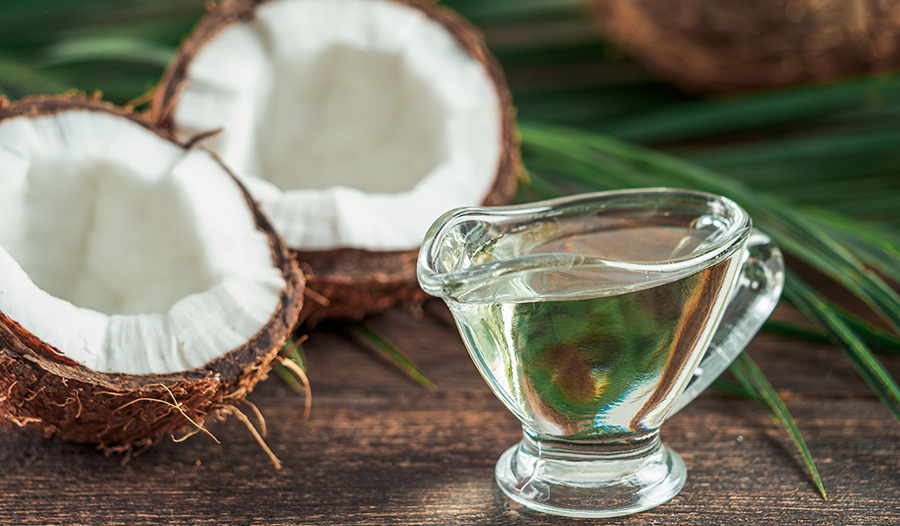MCT Oil—The Ultimate Keto Diet Staple
DISCLAIMER:This blog does not intend to provide diagnosis...
- In this article:
- What Is MCT Oil?
- What Is The Keto Diet?
- How Exactly Do MCTs Work To Support Ketosis?
- Best Types Of MCT Oil
- How To Use MCT Oil While On The Keto Diet
- How Much MCT Oil Should You Consume?
- Can You Cook With Mcts Oil?
- Can You Get MCTs From Coconut Oil Instead?

When following the ketogenic (keto) diet, the goal is to boost your fat intake considerably while also greatly minimizing the number of carbs you eat. This allows your body to convert fats from your diet into ketone bodies, which are then used as a source of “fuel” to give you the energy you need.
Considering it is pure fat, supplementing with a high-quality MCT oil is a convenient way to increase your fat intake and help you stay in ketosis. In fact, MCT oil is often referred to as the “ultimate ketogenic fat.”
Because the body uses these fats very efficiently to make ketones, adding MCT oil to your keto diet can translate to greater benefits, such as help with appetite control and weight management, and fewer “keto flu” side effects.
What Is MCT Oil?
The “MCT” in MCT oil stands for medium-chain triglycerides, which are saturated fatty acids.
MCTs, also sometimes called “MCFAs” for medium-chain fatty acids, are found naturally in fat-containing foods including coconut oil and full-fat dairy products — however, MCT oil is the most concentrated source of these special fats.
What Is The Keto Diet?
The keto diet is different from just about any other diet because it requires you to eat lots of fats. Being in ketosis (when your body is making high levels of ketones to energize you, in place of using carbs) is associated with benefits including supporting healthy energy levels, managing your appetite, and helping with weight management — however, in order to reap these benefits, you need to stick to the correct macronutrient intake.
While it’s not 100% necessary to use MCT oil to increase your fatty acid intake, it’s certainly a popular and easy way to do this. It’s also an easy fat source to digest and simple to use in drinks and other liquids since it doesn’t have much taste.
How Exactly Do MCTs Work To Support Ketosis?
Due to their chemical structure, MCTs are thought to be more easily converted to ketones because the body has to do less work breaking apart their carbon bonds compared to other types of fats, such as long-chain triglycerides.
While following the ketogenic diet, benefits of consuming MCT oil can include:
- Supporting your ability to produce ketones and get into ketosis more easily. Once in ketosis, MCT oil can also help to keep you there.
- Helping with healthy weight management. MCT oil and other fats help to blunt hunger and assist in calorie control when following the keto diet.
- Supporting health energy levels. Consuming enough fats is important while on keto because this results in ketone production that is used for fuel, helping to decrease fatigue.
- Supporting a healthy metabolism by helping to keep your metabolic rate up. Eating fats signals to your brain that your body is receiving adequate energy, therefore supporting thyroid health and your overall calorie burning.
- Helping to boost exercise endurance and performance.
- Supporting cognitive functioning and mental health (enhanced focus, mental stamina and concentration).
- Assisting those who are intermittent fasting. Ketones help manage hunger and cravings, making it easier to lengthen how long you can comfortably fast.
Best Types Of MCT Oil
Pure MCT oil is usually extracted from coconuts or palm fruit. You can’t obtain pure MCTs from any other food source, so taking it in oil form is the best option.
MCT oils can differ a bit depending on which specific types of MCTs they contain. There are four different kinds of MCTs that can be found in MCT oil: caprioc, caprylic, capric, and lauric acids. Caprylic acid (C8) and capric acid (C10), that are mostly considered the best types for promoting ketone production due to their specific chemical structure, so look for these when choosing an oil.
When selecting a keto MCT oil product, it’s ideal to choose one that’s organically made, GMO-free, and pure (no fillers).
How To Use MCT Oil While On The Keto Diet
The great thing about using MCT oil to help get you in ketosis is that it’s super simple to add to your diet. It has a neutral, mostly unnoticeable taste and smell, and typically a creamy texture (especially when blended).
- Try adding MCT oil to liquids such as coffee, smoothies, or shakes. It shouldn’t change the flavor too much unless you purposefully use flavored oil.
- It can also be added to tea, salad dressings, marinades, or if you wish, used when cooking.
- Take it right off the spoon for a quick pick-me-up. You can do this any time of day that’s convenient for you, including first thing the morning or pre or post-workout.
- Many like to take MCTs before a meal to help blunt hunger.
- Another option is using MCTs for support during periods of fasting.
- Blending is especially recommended if you’re using “un-emulsified” MCT oil to improve the texture. Emulsified MCT oil mixes more easily at any temperature, and into drinks such as coffee.
How Much MCT Oil Should You Consume?
Start with a small amount, such as one or two teaspoons per day. This gives your body time to adjust to the higher MCT intake. Then gradually up your daily amount over the course of a week or so to one tablespoon, or potentially two or three if you’re responding well and MCTs are helping you stay in ketosis.
Can You Cook With Mcts Oil?
MCT oil is usually treated more like a supplement than cooking oil. Most people choose to cook with coconut oil, butter, or other fats instead, and to simply take MCT oil by mouth or to add it to liquids such as coffee. One reason is that MCT oil can be expensive, plus you’ll want to monitor how much you’re consuming.
That being said, MCT oil is capable of withstanding low to medium heat, so if you’d like, you can use both coconut oil and MCT oil when cooking meat on the stovetop, sautéing, making stir-fries, etc. without the fats going rancid or oxidizing too easily. MCT oil has a smoke point of 320°F, a bit lower than coconut oil which has a smoke point of 350°F. This means it’s best to skip MCT oil when roasting, baking or grilling.
Can You Get MCTs From Coconut Oil Instead?
While coconut does naturally contain MCTs, MCT oil contains different proportions of these fats. Coconut oil is particularly high in lauric acid, which takes a bit more work to break down than other MCTs. This means that coconut oil is generally less efficient at being used for ketone production, however, it’s still generally recommended while on the keto diet.
In addition to coconut oil and MCT oil, MCTs can also be found in lesser amounts in foods that contain saturated fats, including grass-fed butter, cheeses, palm oil, whole milk, and full-fat yogurt.
Keep in mind, while MCT oil can help you achieve results while on the keto and keep side effects at bay, it’s still important to focus on eating a clean, high-fat, low-carb diet to support your metabolism and overall health.

 By Dr. Josh Axe, DNM, DC, CNS
By Dr. Josh Axe, DNM, DC, CNS


